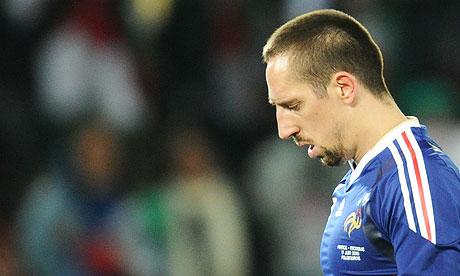
The summer of shame engulfing French football reached a new low today as two players were formally accused of soliciting an underage prostitute.
Franck Ribéry, 27, a midfielder for Bayern Munich and a member of the international side which left the World Cup in ignominy, and Real Madrid's Karim Benzema, 22, face up to three years in jail and a fine of €45,000 (£37,600) if convicted.
Both deny wrongdoing. Benzema has said he is "unaffected'' by the allegation by a former sex worker, Zahia Dehar, that she was solicited separately by the two when she was 16.
Ribéry is married and has two children. He has admitted having sex with Dehar, but insists he was unaware of her age.
In France, although the age for consenting sex is 15, soliciting a prostitute under 18 is a crime. The investigation into the trade allegedly going on in the Zaman Cafe, a late night bar on the Champs Elysées in Paris, was revealed in April when it was raided and more than a dozen women were arrested, including Dehar.
Shetold police she had been paid to have sex with several soccer stars, including Sidney Govou, another player for Les Bleus, as well as Ribéry and Benzema; however, Govou's alleged encounter was in March, by which time she was 18.
According to the testimony of Dehar and Ribéry, Dehar never told her clients she was underage – an important factor in such cases.
Investigators from Paris's equivalent of the vice squad have been trying to establish whether or not, when he asked her to fly to Bavaria for his birthday celebrations in April, Ribéry bought Dehar's plane ticket. If he did, they argue, he would have known her date of birth.
Sophie Bottai, Ribéry's lawyer, told French radio that for her client to be found guilty "he would have had to know her age, which was not the case. She would have had to look like a minor, which was not the case. She would have to be claiming that she had told him she was a minor, which is not the case."
The saga was put on hold during the World Cup, but has now thrown a spotlight on France's younger generation of soccer stars, who are struggling to inspire the respect which fans had for their predecessors. Even before they jetted to South Africa, many of the players had shaken France's usually firm pride in Les Bleus with a combination of dispiriting performances on the pitch and unseemly and extravagant lifestyles off it.
When their 2010 bid for World Cup glory ended in defeat, mutiny and foul language, the sense of malaise was reinforced – and the president, Nicolas Sarkozy, summoned veteran player Thierry Henry to explain himself. Henry, a member of the legendary squad which won the World Cup for France in 1998, rubbed salt into the wound by announcing last week he would never again play for Les Bleus.
Last night, former sports minister Bernard Laporte criticised the attention given the allegations. "We make things very important which are perhaps not all that important. He [Ribéry] hasn't killed anyone … I don't believe in a severe punishment. I don't believe in that at all, as logically speaking, when you see this girl you don't think she's underage." He added, nonetheless: "No one is above the law.
